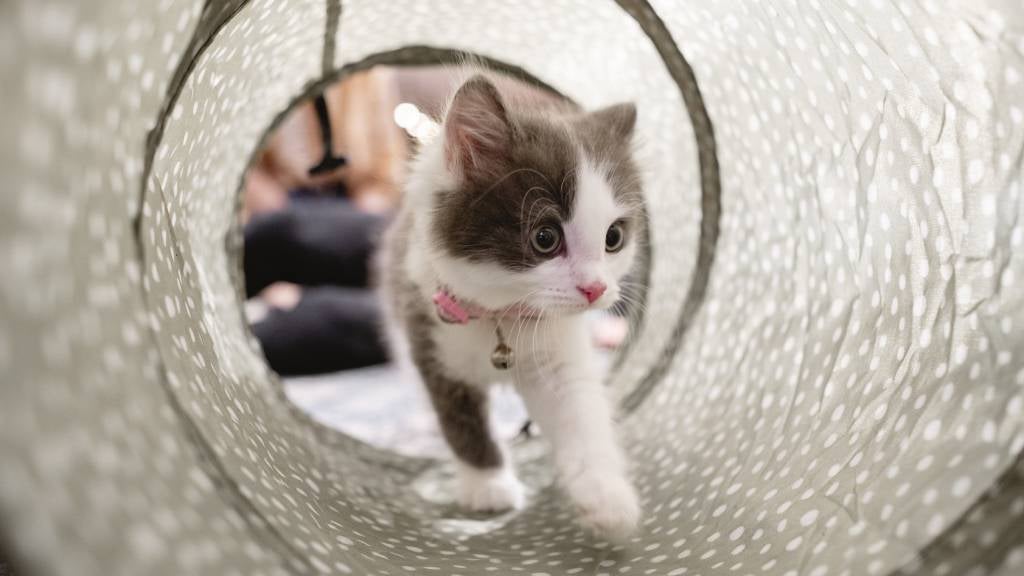How to keep your pets busy while you’re busy working

In an ideal world we’d love to have our pets with us all the time but it can’t always be that way! There’s lots of errands that fill a busy life taking us away from home, including work. So when we’re away we want to be sure our furry mates won’t get bored and are safe when being left home alone.
How long your pet can stay home alone depends on many factors, like age, physical, medical and emotional needs. While these needs will vary with the circumstances, here are a few tips on how to keep your friend out of mischief and amused.
Tips to keep your pet entertained
Teach them it’s ok to go solo
This is one to start early in life. Being ok with being alone is an important life skill to teach our pets. Yes, we know they’re cute and deserve all of our undivided attention but it’s simply just not practical. Start with short periods where they’re left to their own toys or a fun puzzle feeder in a safe environment while you’re home and then progress to keeping them busy in separate room, then leaving the house for increasingly longer periods of time. Stay strong and resist that sooky look.
Create a safe space
Crate training dogs can be a really good way to create a safe space and you can be reassured the house won’t be destroyed in your absence. You need to introduce the crate gradually to ensure you build a positive association so your dog is happy to stay in their crate. Other options are to reserve a blanket, perch, box, or whatever your pet prefers where they don’t get disturbed, as their safe place to go to when you’ve left the house.
Leave the TV or radio on
If your furry mate is used to a bit of noise when the house is full of people or activity then leaving a radio or TV on can be consoling. If it’s your voice they respond to best then consider making a recording.
Use a calming diffuser
You can buy synthetic pheromones, like Feliway for cats or Adaptil for dogs which have been proven to have a calming effect by mimicking animals’ natural pheromones. They come as plug-in diffusers, collars, or a spray you can put on bedding or a bandana.
Don’t make a big deal about coming and going
Before you think about giving them the celebrity treatment, stop. Try to avoid an obvious routine before you leave the house. Don’t make a fuss of your pet as you leave and wait until they’re calm when you get home before saying hello to them.
Keep them distracted
Some of our furry companions will be perfectly happy snoozing the time away dreaming of treats and toys. But for those with more energy, anxiety, or destructive tendencies, there are many options like chew items or toys like food dispensing puzzles, frozen tasty licks, interesting smells, digging pits, scratching posts etc. to choose from. You can buy these from pet shops or make your own. You can even hide kibble around the house so they can keep themselves busy with a treasure hunt while you’re out.
A companion can help too - maybe arrange a ‘stay over’ or get a friend, house-sitter or dog walker to spend some time with them. You could also book a kennel or daycare facility if it’s likely to be an extended period you’ll be away for.
Tire them out before you leave
Burn off that excess energy and spend some quality time with them, to make it more likely they’ll want a snooze and then you can leave without that guilty feeling. You can also go for a long walk, throw a ball, play with a wand toy or work on a new trick as mentally challenging activities are also tiring and will keep them stimulated and mentally exhausted.
Leave your scent
Familiar smells help them feel safe so leaving something like an unwashed top in their safe place can be a good comforter.
Pet-proofing the place for your pet
Our furry bundles of joy have a knack for being curious from time to time so it’s best to think of ways to keep them safe when your attention has to be on other things like work. Think of removing foods from counters, putting shoes away and other things they like to chew in a closed room out of reach. This will help to set them up for success and also keep them out of any mischief.
Avoid blame or punishment if accidents happen
If you do come home to find your pet has been mischievous or there’s an unexpected mess there’s no point in punishing them. They won’t associate the punishment with the mess, just that you’re not happy and a bit of a grump to be around when you get home.
Being prepared and thinking ahead makes short separations less stressful for both you and your beloved fur baby. If behavioural problems do develop then you could seek advice from a vet, certified behaviourist or force-free trainers.
In case of any future health problems, consider taking out SPCA Pet Insurance so you can treat yourself to a happy pet.
10 Dec 2021